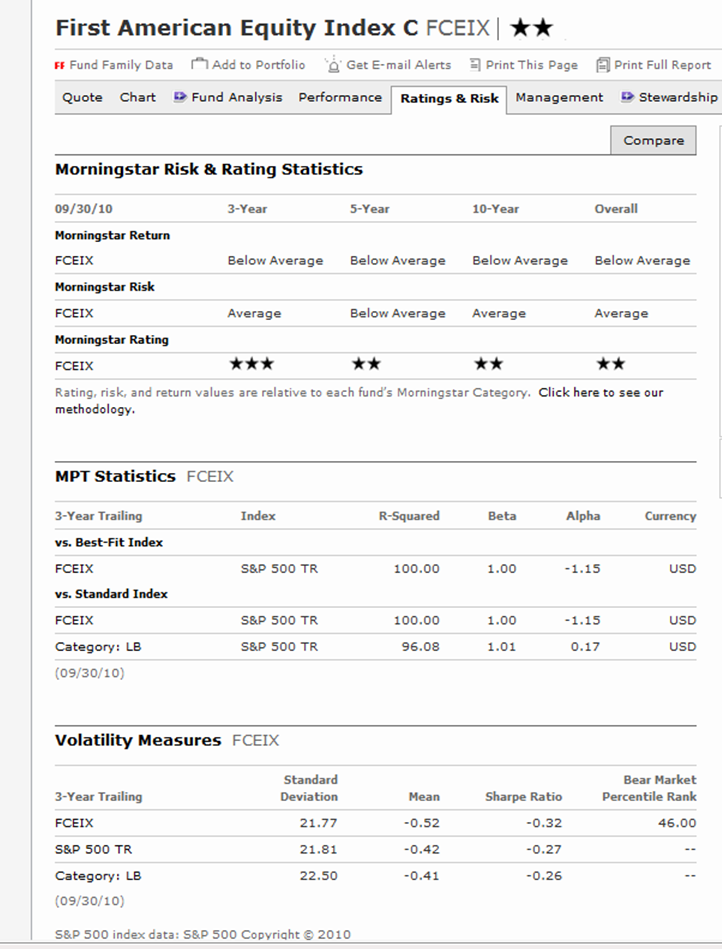Keith from Kalamazoo, MI writes:
I have done a good job contributing to my 401k. However, I am lost when it comes to selecting the right portfolio among the 2 dozen choices in my plan. What should I do to make good investment selections in my 401k?
Friedenthal Financial:
Keith,
Contributing to your 401k/403b plan can be an important part of your retirement. Making the right investment selection is equally as important. The three areas on which to focus are 1) overall portfolio volatility, 2) diversification among investments, and 3) cost/efficiency of selected funds.
Your desired risk level is based both on anticipated time until distribution as well as personality. Think about risk relative to some standard benchmark that has some meaning to you (i.e. S&P500). Examining a fund’s Standard Deviation (volatility) and Beta (relative to a benchmark such as the S&P500, if it is correlated) serve as tools to estimate risk. Consider reducing your risk as you get closer to retirement, if you will be withdrawing principal to cover your living expenses.
Even though each fund is diversified across a large number of underlying securities, you can still reduce your risk by being smart about the combination of funds you have in your portfolio. Look for some representation of equities across domestic, developed international, and emerging markets. Look for fixed income funds of varied credit exposure (e.g. high yield, investment grade, treasuries) and tenor (e.g. 2-5 yr, 5-10 yr, 10+ years). You may have the option of selecting some commodity exposure as well (e.g. precious metals, agriculture, fuels). The proportion invested in each fund must be selected to be consistent with the overall desired level of risk, since volatility varies dramatically across different types of funds.
Costs of mutual funds also vary greatly. Be mindful of the expense ratio (on-going costs of the fund), front load (cost when purchased), back load (cost when sold), and early termination fees (only assessed if sold within some specified time limit). Some funds have some combination of these fees. Costs will generally be higher for less liquid sectors/classes of investments, which can be reasonable. However, you should strive to find the most cost effective selection of funds to achieve your desired level of risk and diversification. The Dept of Labor publishes a useful link on this topic.
http://www.dol.gov/ebsa/publications/401k_employee.html
To get a better sense of how different expense ratios impact performance for two otherwise extremely similar funds, let’s take a look at an example of two mutual funds that you could find in your 401k fund menu. First American Index Fund (FCEIX) and Principle Large Cap S&P 500 Fund (PLFIX) are both “large cap” US equity funds with have very similar risk characteristics. To examine the relative risk profiles of these two funds, we measure the Beta and R-Squared of these funds to EACH OTHER (not against a common benchmark). When comparing the 1 year weekly percentage changes of these two funds, we see that they have a r-squared (correlation) of 100% (This may be rounded….but it’s extremely close to perfect) and a beta of 99.9 (very close to 100% which would indicate the same relative sensitivity, given the very high correlation).
Comparitive Statistics
The difference in performance (as shown below) is primarily due to the difference in expense ratios of these two funds.
FCEIX has a yearly expense ratio of 1.37% (and a back-load of 1%), while PLFIX has an expense ratio of 0.19% and does not have any loads. The difference in cost shows up in the 1.12% difference in annual performance. That’s a big difference considering the risk profile is almost identical! Since 12/31/01, the TOTAL RETURNS for these 2 funds has been 12.87% and 4.05% respectively. Selecting the fund with the lower cost would have produced more than THREE TIMES the total returns during that period.
One Year Performance
Long Term Performance
Now, we understand that you may not have the time or the resources to do all of the calculations between these funds, but there are tools you can use to get a general idea of how your fund choices compare. Morningstar.com is a great place to start. Some key tabs to look at when you are evaluating a fund are the “Expenses” and “Ratings & Risk” tabs. These tabs show just about all of the risk and expense information you will need to help you make an informed decision about your 401k fund selection. See below for examples from Morningstar.
Morningstar – Expenses Tab
Link:http://quicktake.morningstar.com/FundNet/Fees.aspx?Symbol=FCEIX&Country=USA
Morningstar – Ratings & Risk Tab

Link:http://performance.morningstar.com/fund/ratings-risk.action?t=FCEIX®ion=USA&culture=en-US
We hope that helps and provides fodder for discussion. Please let us know if we can be of further service!
The Friedenthal Financial Team
856-210-6494 (Office)
856-210-1565 (Facsimile)
Please send us your questions!! If we don’t know the answers, we’ll find someone who does!
If you know someone who would like to discuss their investment needs with us, we certainly appreciate the introduction.
This blog is only intended to provide answers to questions of general interest we receive on the topics of investments, finance, capital markets, and economics and to serve as a historical repository for our e-mailed Asked & Answered column. We are not rendering or offering to render personalized investment advice or financial planning advice through this blog or any of its attached links. Friedenthal Financial will render investment advice to potential clients only after: (i) we have delivered a disclosure statement to the potential client as required under applicable securities laws, and (ii) the potential client has executed and delivered Friedenthal Financial’s investment advisory contract to us. We will provide investment advisory services to clients only in states in which Friedenthal Financial is registered as an investment adviser or is exempt from registration.




